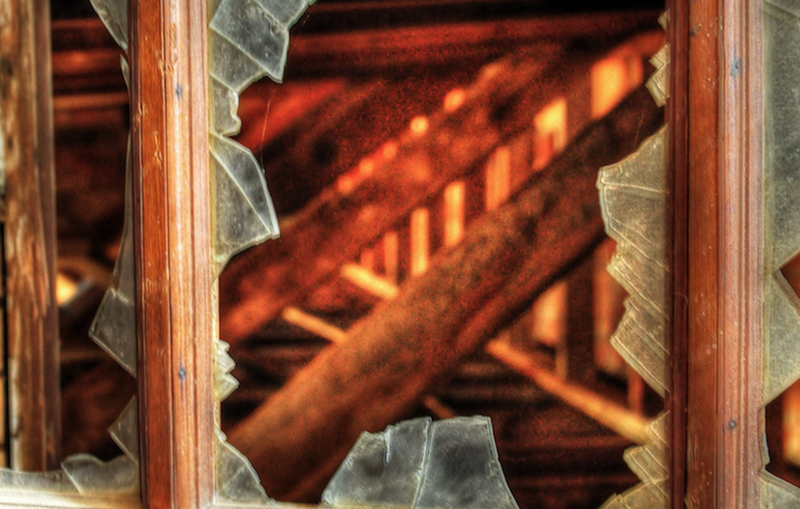Harsher sentences for school vandals
Updated | By Terence Pillay
"The recent spate of violence and destruction of property at South African schools is beyond disturbing," says Terence Pillay

Listen to Wednesday's Good, Bad, and Ugly, or read the detals under the podcast.
There have been a number of pretty shocking reports on the behaviour of some school children across the country. The most recent that I read involved a group of aggrieved matric pupils from a school in the Eastern Cape who apparently went on a rampage, burning down the school's administration block because their demand that they be allowed to write all seven subjects, and that their Grade 11 report cards reflect they passed all their subjects in 2017, despite having failed was met with resistance from the school.
According to reports, the pupils went on a rampage burning down the school buildings and assaulting the deputy principal. The protest led to 350 pupils failing to write English first additional language paper one, and according to the Department of Education Spokesperson, Mali Mtima, the pupils and their parents were currently in talks with the school, department officials, the police and unions to come to a common understanding on the way forward.
READ: Education officials head to KwaDabeka school after security protest
So here’s the thing: Why is anyone even in talks with the criminals? And yes, they are criminals because they’ve broken the law – they’ve destroyed property and assaulted a person, which is illegal. They should be charged accordingly and made to face the repercussions of such behaviour. I don’t care that they are young and in high school. What exactly is the message we are sending to these children by mollycoddling them and excusing this violent and criminal behaviour? And what will they take away from this – that they can destroy property and commit crimes with impunity when they don’t get their way?
The fact is: This is just one story of the kind of rampant disregard for authority and the law that school-goers have in this country. Twenty percent of South Africa's teachers believe that schools are violent places and suspect their students and colleagues are armed. This is according to a survey conducted by the Human Sciences Research Council with the Department of Education among more than 20000 teachers at 1380 schools across the country.
A few years ago, pupils at a school in Montclair in Durban vandalised their school in an attempt to oust their principal. They used stones and chairs to break windows and trash offices, including destroying computers, and some even carried bush knives to school.
In February this year, violence broke out in a school in Rossburgh and pupils went on a rampage to protest overcrowding at the school. And two years ago an office and a library were vandalised during a protest at Orlando High School in Soweto over the suspension of a teacher.
A representative of the Department of Education said pupils locked teachers and workers inside the school grounds while they demolished the office building. They broke windows and overturned tables. The representative said police officers stood by helplessly and watched as pupils destroyed the office and local residents watched from outside the school fence.
Then in June this year, Minister of Basic Education Angie Motshekga planned to lobby for a change of legislation to ensure that people who burn schools and infrastructure are punished harshly. Motshekga also wanted a new legal dispensation to make sure those found guilty of destroying school properties are sentenced to longer terms.
According to an article by Corene De Wet in the South African Journal of Education, school vandalism has negative economic and psychological implications for education. On the other hand, well-cared for school facilities, furniture and equipment, as well as clean toilets, are conducive to a healthy teaching and learning environment.
The article further says that learners, particularly boys between the ages of 14 and 19, are the main vandals. However, it is clear that schools are regularly vandalised by herdsmen, gangsters, drop-outs, ex-learners, and learners from neighbouring schools. The research indicated that juridical, economic, drug and alcohol, as well as learner-related, problems are considered important causes of school vandalism.
So what are the solutions? Basic Education Minister, Angie Motshekga, is calling for harsher sentences for those caught, arrested and tried and sentenced. In fact, in March this year, a 17-year-old Avoca Secondary School pupil was arrested for malicious damage to property, following a chaotic protest by a large number of pupils who burnt tyres and stoned vehicles on the road.
The pupils demanded that they wear braids or hair extensions to school, which currently is not permitted by the school code of conduct. They also raised the issue of not having sports facilities at the school and the tuck-shop selling unhealthy food at a ridiculously expensive rate.
At the time Education Department spokesman, Kwazi Mthethwa, said the department does not condone such acts of anarchy at schools. He said pupils should not vandalise property as they will be arrested for such acts of criminality.
What do you believe are the solutions to keeping our schools safe and free from this kind of violent and criminal behaviour?
You can email Terence Pillay at [email protected] or follow him on Twitter: @terencepillay1and tweet him your thoughts.
Main image courtesy of iStock/justinecottonphotography
Show's Stories
-
Durban Super Giants captain shares exclusive SA20 insights
Keshav Maharaj joins the East Coast Breakfast squad to share his exclusi...
East Coast Breakfast 2 days, 12 hours ago -
Get hired in 2025: In-demand jobs and skills in SA
Ready to thrive in the 2025 job market? Here are the top in-demand jobs ...
Stacey & J Sbu 2 days, 14 hours ago